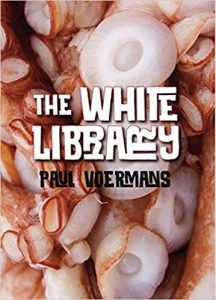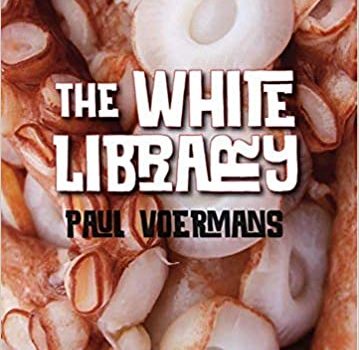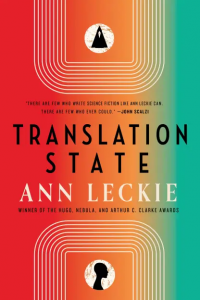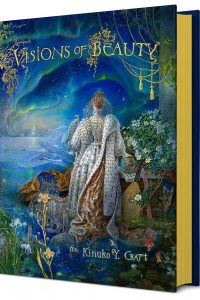Ian Mond Reviews The White Library by Paul Voermans
 The White Library, Paul Voermans (PS Publishing 978-1-786365-92-4, £25.00, 246pp, hc) November 2020.
The White Library, Paul Voermans (PS Publishing 978-1-786365-92-4, £25.00, 246pp, hc) November 2020.
Because it happens so rarely, I always get a buzz when my hometown of Melbourne is depicted in genre fiction. It’s even exciting when it’s an alternate version of the city with a different name and a divergent history, provided I can recognise the famous landmarks, the streets, and alleyways. This is the case in Paul Voerman’s first novel in nearly 30 years, The White Library, where he imagines a parallel timeline in which the fabled Terra Australis is first “discovered” by the Spanish explorer Alvaro de Mendana de Neira and then later colonised by the British. This altered history sees Australia renamed the Federated Kingdom of Mendania and Melbourne changed to Cavendish, though the suburb remains the State of Victoria’s capital city. Voermans does not spell any of this out; it took me a good 20 or so pages to realise that despite the strong resemblance, with trams trundling down Swanston Street and the dome of the Victorian State Library glinting in the sun, this was not my Melbourne. What does become clear is that Voermans’s alternate history, where the year is 1983 and humanity has colonised the moon and Mars, is there to provide texture but also add a further level of dissonance to a story about a woman trying to find her way in a world that hasn’t yet entirely accepted her.
The woman in question is Angela Donohoe. For those who’ve read Voermans’s second novel, The Weird Colonial Boy, she is the sister of Nigel Donohoe, the protagonist of that story, making The White Library a sequel of sorts. When we first meet Angela, she is being interviewed for a job at the Victorian State Library by the exuberant and chatty Frederic Hillacre. He leads the “Byllion Book Search Unit”, a small team that hunt down rare books for customers. “But it’s more than that,” Frederic explains to Angela, “A library isn’t just an institution anymore. It has to fly! It has to soar, It’s a part of a network. So we have to work with other libraries as well. It isn’t just a building.” Angela’s role is to use her computer skills to start developing this network, to make it easier to “gather information at a distance.” The thing is that Angela is more than just adept at working with computers. She is a physicist with a unique, neurodiverse, and literal manner of parsing the world. As such, rather than develop a computer network, or a proto-form of the Internet, much like Voermans did in his role at the State Library in the ’90s, she creates a portal, a crack in space that allows people to travel to destinations instantaneously. Angela’s incredible invention is more than just a teleporter though; travelling through it can fundamentally change a person in unimaginable ways.
Even if you’re not from Melbourne or don’t appreciate the way Voermans’s alteration to the State, including Australia’s political landscape (I found both moving and upsetting the treatment of Prime Minister Gough Whitlam in this timeline), there is still so much to enjoy about The White Library. First, there’s the bonkers plot, which I’ve made a point of providing as little detail as possible, though I will say it features a romance as heartfelt, genuine, and unconventional as anything you’re likely to encounter in literary or genre fiction. Then there’s Voermans’s love letter to the Victorian State Library and its Great Dome, the beautiful, poetic way he captures this astonishing monument to books, one that has me longing to go back there once life returns to some vague sense of normality. There’s also the memorable cast of characters, not just Angela and Fred but the members of the Unit, Peter and Elly, and those we encounter along the way, Rosie and Alfred, all of whom have their hang-ups and neuroses but are also incredibly warm, generous and oh-so-tragically human. And finally there’s Voermans’s use of language, sentences, and paragraphs that go in unexpected directions, reflecting Angela’s mental tics, her anxious but vibrant perspective on the world. It does mean that The White Library has a short learning curve, a requirement to read the opening clutch of pages slowly so you can find the novel’s rhythm, it’s peculiar beat. But once you do, the novel is a joy to read, brimming with wild ideas, vibrant characters and a cinematic, sense-of-wonder denouement, that’s a poignant hat tip to one of the genre’s great luminaries, James Blish, and a literal expression of Fred’s vision for libraries and institutions of learning across the world.
This review and more like it in the April 2021 issue of Locus.
 While you are here, please take a moment to support Locus with a one-time or recurring donation. We rely on reader donations to keep the magazine and site going, and would like to keep the site paywall free, but WE NEED YOUR FINANCIAL SUPPORT to continue quality coverage of the science fiction and fantasy field.
While you are here, please take a moment to support Locus with a one-time or recurring donation. We rely on reader donations to keep the magazine and site going, and would like to keep the site paywall free, but WE NEED YOUR FINANCIAL SUPPORT to continue quality coverage of the science fiction and fantasy field.
©Locus Magazine. Copyrighted material may not be republished without permission of LSFF.








